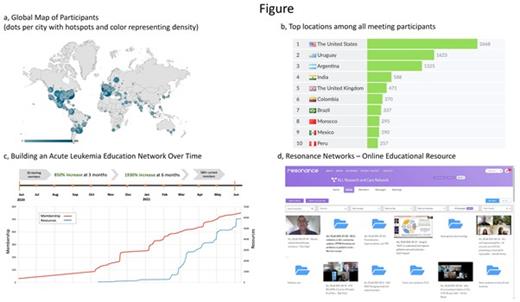Abstract
Introduction: Clinicians in academia face four major career challenges:
Gaining clinical advice from colleagues experienced in a particular disease or treatment
Experiencing Life-long coaching and mentoring from senior experienced clinicians
Accessing high quality continuing medical education relevant for patient care
Support to carry out medical research
All four challenges have been adversely impacted during the Covid-19 pandemic as traditional face-to-face networks have become harder to access. This is especially pertinent when treating complex or rare diseases like acute lymphoblastic leukemia (ALL). Atypical or refractory patients, and those who experience toxicities often benefit from timely input from experts with considerable experience managing ALL. Online networks offer a robust pandemic-proof source of health and care support and advice. Until recently there have been few dedicated professional networks that provide a regular online forum dedicated to research and care on specific diseases across countries and none related to ALL.
Methods: We describe the Resonance ALL Research and Care Network (ALL RCaN; https://resonancehealth.org/networks/all-rcan ) which includes a network of colleagues and a weekly, multidisciplinary online forum that brings together pediatric and adult hematologists and oncologists from around the world to share data, discuss cases and support patient care. In addition, there is a monthly 'Fellows Fourth Friday' to help fellows build their own professional network and gain scientific and clinical advice. The network was born out of a monthly meeting of study chairs (the "Study Chair Affinity Group") for ALL research protocols which had been running for 10 years.
Results: The network launched formally in June 2020 with 30 founding members but has expanded rapidly through word of mouth. The Acute Leukemia network grew by 850% by Dec 2020 and 1460% by March 2021 and as of July 2021 has 579 members across 18 time zones. It has succeeded in 'Building ALL Bridges" between physicians that treat adults and pediatricians for joint discussions in acute leukemia. This collaboration has been severely lacking in the past. The network also presents selected abstracts from major national and international conferences every 4 weeks. This model has been replicated for other cancers including the Global Neuroblastoma Network (resonancehealth.org/networks/gnn) and High-dose Methotrexate Quality Improvement Network (resonancehealth.org/networks/hdmtx). Network software development, video conferencing, meeting coordination, and content hosting have been funded by volunteer network leaders, many volunteer presenters, philanthropic contributions, and unrestricted educational grants. Now that the Resonance infrastructure is fully developed (and available to all at no cost), most Networks function well without funding.
Conclusions: Providing free video conferencing, content hosting, and network management tools combined with dedicated leadership and clinically relevant discussions and presentations has led to massive growth of the ALL Research and Care Network, which continues to grow. Networks for other cancers are in various stages of development since the tool set and methodology easily scales to new groups of colleagues and new diseases.
Guscott: EUSA Pharma UK Ltd: Ended employment in the past 24 months. Douer: Amgen: Consultancy, Speakers Bureau; Servier: Consultancy, Speakers Bureau; Jazz: Consultancy; Adaptive: Current holder of individual stocks in a privately-held company, Current holder of stock options in a privately-held company, Speakers Bureau. Howard: Cellworks Group Inc.: Consultancy; Sanofi: Consultancy, Other: Speaker fees; Servier: Consultancy.


This feature is available to Subscribers Only
Sign In or Create an Account Close Modal